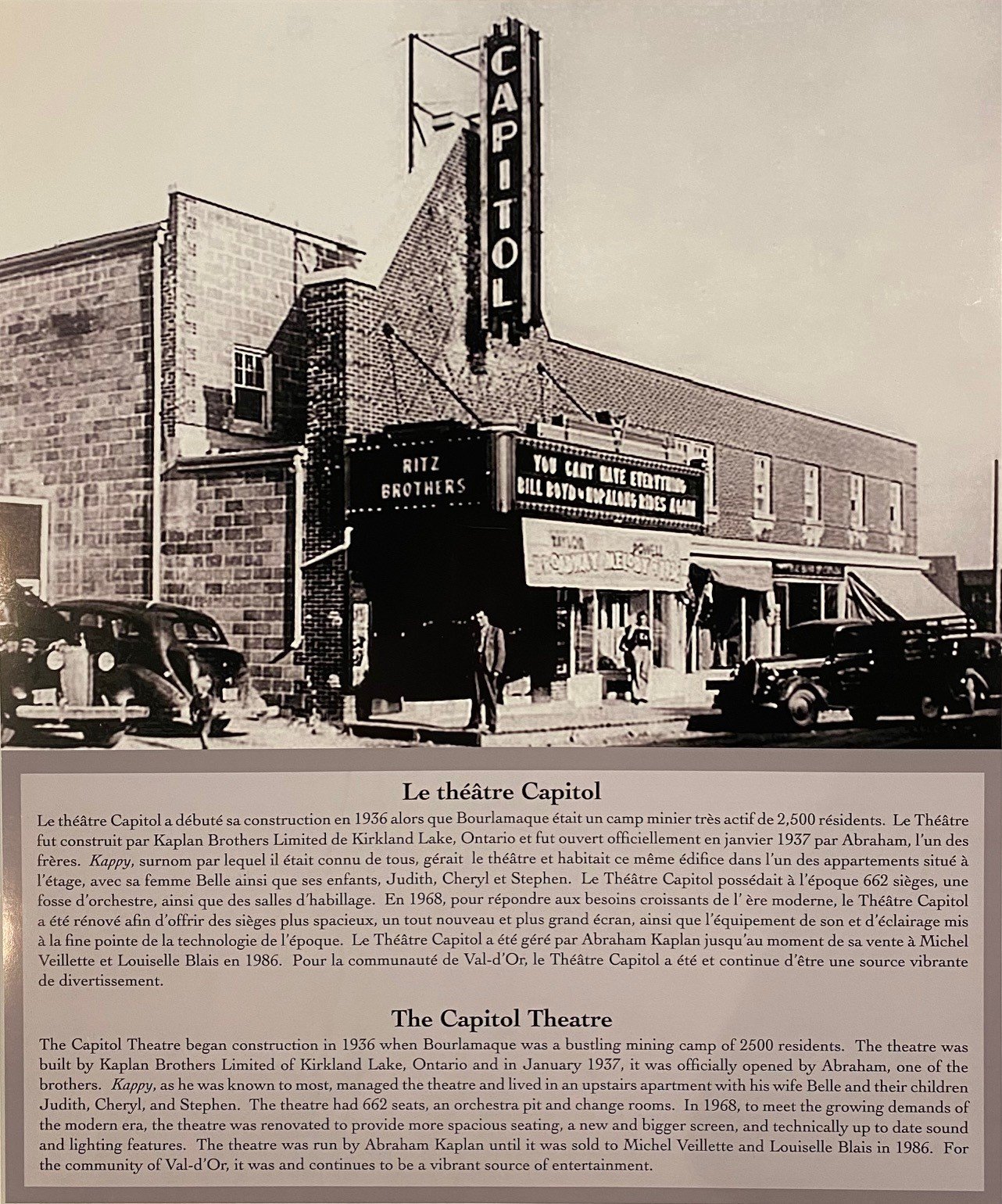If the vintage popcorn machine at Val d’Or’s historic Capitol Theatre could talk, the stories it might tell would be more Jewish than you think.
That’s because the multiplex, which opened in 1937 as a bijou with 662 seats, was built by Abraham Kaplan, a member of one of the pioneering Jewish families in the northern Quebec community.
It was 85 years later, on June 10, when his three children returned to Val d’Or for a municipal ceremony paying tribute to the multicultural founders of the mining district.
The Kaplans also donated a specially framed picture of their father standing outside the Capitol on opening day, complete with an inscription about the family’s contribution to the fabric of the community. The photo and plaque will be displayed inside the cinema that their father went on to run for nearly half a century, until he moved to Toronto upon retirement in 1986.
“It’s hugely important to me,” said Cheryl Kaplan Hughes, 77, a retired Toronto teacher. “It brings closure to my life.”

Kaplan family of cinema pioneers
Cheryl and her older sister Judy Wineberg, 83—who also lives in Toronto—were raised in an apartment above the theatre, along with their baby brother, Stephen Kaplan, now 73. (He lives in London, Ont.)
Abraham “Kappy” Kaplan was a Jewish immigrant from Lithuania who came to Canada with his family when he was a teenager. And they settled in Kirkland Lake, Ont.
Abe’s father Hyman went into business with a brother-in-law, opening up a shop to provide picks and shovels and supplies to eager prospectors trying their luck in the Kirkland Lake region’s gold rush.
As the story goes, one of their customers, Sir Harry Oakes, usually bought things on credit. But he struck it rich in 1912 after he discovered what would become the Lakeshore Mine.
And, to repay the Kaplans for their kindness, Oakes offered to finance the construction of a local movie theatre called the Strand.
From those humble beginnings in Kirkland Lake, the Kaplans built a cinema chain in Northern Ontario. Abraham was given his own to run in nearby Bourlamaque, now part of the municipality of Val d’Or, Que, called the Capitol.
Cheryl explains that her dad was happy to move to Quebec—as a way of independently establishing himself in business, in this less crowded town.
The Capitol was built by architect Herbert George Duerr, who designed many striking movie houses across Ontario, including the Hollywood in Toronto and the Regent in Sudbury. It had an orchestra pit along with change rooms for touring performers who included Maria von Trapp and Oscar Peterson.
Abe went on to build two smaller area movie theatres: the Marcel and the Strand. Both of these have since closed, but the Capitol is still operating as a five-screen multiplex—the only public places to see a movie in Val d’Or.

Judy Wineberg worked in the ticket booth of her dad’s flagship. She loved the job, even though it caused a big controversy when Abe raised the price of a ticket by a nickel, to 50 cents.
“You got to see everybody,” she explained, “because that was the gathering place.”
Living above the theatre had many advantages, including being able to pop in and out of her favourite shows as many times as she liked. On a signal from the ushers, Judy and her mother Belle would fly down the stairs from their apartment just to hear “The Anniversary Waltz” play during the 1946 run of The Jolson Story.
“Oh, how we danced, on the night, we were wed,” Judy sang. “She and I were absolutely addicted to it.”
Stephen Kaplan also worked for his father, starting with selling Polar ice cream bars for a dime during intermission. (His commission was 2 cents.)
Eventually, he graduated to ticket taker—but being allowed to manage the theatre remained out of reach before he left for university.
“At 16, I just couldn’t convince my father to retire,” he said with a laugh, adding that Abe Kaplan ran the Capitol for almost 50 years.
It was only due to failing health that he sold it to some local business people when he did.

While the two daughters were sent to live in Toronto with relatives when they reached marriageable age, Stephen Kaplan went to high school in Val d’Or and made life-long friends. He experienced what he called mild antisemitism but chalked it up to “kids will be kids.”
Despite over 500 kilometres of distance between Val d’Or and Montreal, the Kaplans also grew up as observant Jews. Their mother kept a kosher home and would order meat in bulk.
But as the siblings recall, refrigeration techniques of the era rendered many of the parcels fit only for immediate cook-outs when the parcels arrived—if they didn’t end up being thrown away.
Moreover, they relied upon the movie theatre’s freezer to store the meat, which led Belle to be mortified when an employee helpfully informed her the latest delivery was stashed between the ice cream bars.
Val d’Or had its own synagogue for a very short time—it lasted two years, according to Judy Wineberg’s estimation.
It was hard to find a minyan on holidays because the six Jewish families in the community often left town to visit relatives living in more robust Jewish communities in Timmins and Kirkland Lake, if not Toronto and Montreal.

And while her girls were born during the summer in Toronto, Belle Kaplan couldn’t travel south for Stephen’s birth in the dead of winter. The roads were treacherous, and yet somehow Abe managed to have the ritual circumcision ceremony performed right in Val d’Or.
“Don’t ask!” said Judy Wineberg, with a laugh, but then went on to describe in detail how her father convinced the late Rabbi Samuel Cass of Montreal to appear as the mohel—and bring some kosher food with him to celebrate the brit milah.
Popcorn machine still works
When they visited their hometown last Friday for the tribute, the siblings also got to see their late parents honoured on an adjacent sidewalk of memorial bricks, known as Pointe des Nations.
Later that day, the trio paid a visit to the current owners of the theatre, Louiselle Blais and Michel Veillette. The owners handed out popcorn from the vintage cooker—which works as well as ever. And then they promised to display the Kaplans’ plaque in the candy bar, where modern customers can stock up before watching the current blockbusters including sequels to Top Gun and Jurassic Park.
Blais says while she never got to meet the original owner, her husband remembers Abe Kaplan as a very kind person who smiled a lot.

As the Kaplan children reminisced about how they struggled to maintain their yiddishkeit while bringing Tinseltown to a place whose name translates as “Valley of Gold,” they also recalled how much they learned about Hollywood movies along the way.
Cheryl admits to “crying hysterically” during Imitation of Life with Lana Turner in 1959, but Stephen recalls another film that same year which interested their father and his friends even more: Anatomy of a Murder, which featured some provocative posing from actress Lee Remick.
“It was like a two-second clip,” he recalls. “And yet, my dad would bring in three or four cronies just to see that one scene.”

Author

Ellin is a journalist and author who has worked for CTV News, CBC News, The Canadian Press and JazzFM. She authored the book Double Threat: Canadian Jews, the Military and WWII (2019) and contributed to Northern Lights: A Canadian Jewish History (2020). Currently a resident of Richmond Hill, Ont., she is a fan of Outlander, gardening, birdwatching and the Toronto Maple Leafs. Contact her at [email protected].
View all posts








